5 Futuristic Predictions That Now Sound Hilarious

Science fiction has one main job -- to imagine the future, so it's kind of embarrassing when it totally fails at that. Sure, the writers aren't psychics and the stories can still be good -- but looking back from 2020 (a perfect year for hindsight), some predictions from decades past look especially puzzling. For example...
Women Will Go Into Space ... So That The Guy Astronauts Can Get Laid
If you haven't seen the 2014 movie Predestination starring Ethan Hawke, Sarah Snook, and Noah Taylor, then you should totally watch the 2014 movie Predestination starring Ethan Hawke, Sarah Snook, and Noah Taylor. We're not spoiling anything by saying that parts of the movie are set in the 1960s -- just not the historical 1960s. We're talking about the '60s as pictured by science fiction writers in the '50s, with space travel and ass-backwards gender politics, like a rocketing Mad Men. Funnily enough, "mad men" is exactly what a couple scenes are about -- men in long space trips, going mad from not being able to release the stress (and by stress, we mean their jizz).
Of course, there was never a space geisha program in real life -- but that doesn't mean the filmmakers made it up. The scene is lifted straight from the short story that the movie is based on, "All You Zombies," written by Robert Heinlein in 1958.

It wasn't even Heinlein's idea. Back when space travel only existed in fiction, and no one had seen Earth from the outside, some people were less concerned with the Blue Marble than they were with blue balls. Being the '50s, it was just assumed that spaceships would pack as many wieners as an Oscar Mayer delivery truck (in fact, equating "man" with "wiener" is another plot point in Heinlein's story). And how would these brave, manly pioneers of the new frontier deal with being horny on Mars? That's what writer and astronomer Robert S. Richardson wondered in a 1956 article. Would the spacemen resort to jettisoning their private payload by hand? Would they get down and dirty with (gasp) each other? Of course not, concluded Richardson -- that would be "degrading." Not degrading, according to him: Load the ships with girls to be used as living sex dolls.

Not everyone was on board with Richardson's cosmic pimping, though. C.S. Lewis, of Narnia fame, wrote a short story called "Ministering Angels," to show what would happen if this was done for real. But if you're guessing that Lewis' response to Randy Robby R. was "your idea is disturbingly misogynistic and you shouldn't come near me, my friends, or my family," then you don't know the author of Furry Jesus' Child Soldiers. Nope, his objection was more along the lines of "only weirdos and ugly hookers will be game to ride the astronauts' flesh rockets."
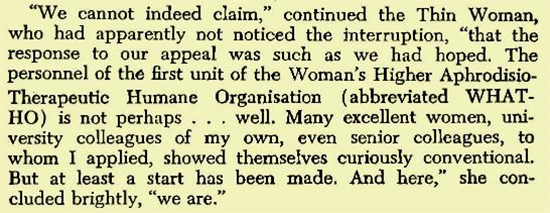
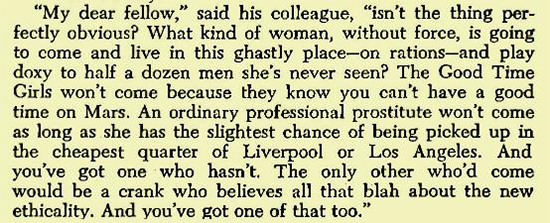
Richardson was so utterly wrong that he managed to wrap around and be right about something. He knew society would frown on space expeditions carrying gals to help the guys with their personal blastoffs -- so, he posited, society had to change. And change it did eventually, just in a way that somehow never crossed Doctor Richardson's mind (or the minds of any of the other fine gentlemen). Only seven years after his thirsty thinkpiece, Soviet Valentina Tereshkova took the Vostok noisy elevator to orbit -- not to be anyone's floozy, but because she was a goddamn cosmonaut herself. And on the other side of the Iron Curtain, American Sally Ride followed on Tereshkova's blazing footsteps barely, uh, 20 years later. Yeah, the U.S. sure took its sweet time to greenlight women astronauts. But at least it happened before anyone got their ass to (and ate ass on) Mars.
The Government Will Kill You To Give Away Your Organs
In 1967, an anthology titled Dangerous Visions was published by Harlan Ellison, the shock jock of Nerdland. Ellison had the explicit purpose of upsetting readers, and the collected stories posed such earth-shattering questions as, "What if a universe-hopping dude was gay?" or "What if a dollhouse could tell the future?" (People were very easily upset back then.) A young author named Larry Niven, however, had a more pressing concern: "How will the government murder us to replenish organ banks?"
Organ transplantation wasn't a new thing in the 1960s -- but the receiving patient staying alive after the surgery totally was, and Niven found this spooky. So his contribution to the collection was "The Jigsaw Man," set in a future where the organs of death row convicts are harvested for the benefit of law-abiding citizens. After some thrilling action, we learn the crime the protagonist is being sentenced to death for: speeding and running red lights -- because now every little offense is a capital offense, in order to keep the taxpayers well stocked with spare parts. In case the point isn't hammered home unsubtly enough, Niven repeats it in the afterword:


"No," Niven says, very sure of himself, "this slippery slope isn't just for the sake of telling a chilling tale -- this slippery slope is definitely your future." Well, over 50 years have gone by since, and the only place where anything remotely like this happens is China -- and even there, the organ harvesting is more like an afterthought to the nilly-willy dispensing of lethal injections by an already dictatorial rule. Everywhere else, patients have to deal with long waiting lists, and unwilling donation is widely condemned -- it's not like everyone is going "yeah, sure, let's execute loiterers so we can drink ourselves stupid with their livers."
Niven was called out on his bullshit even at that time. In a review of Dangerous Visions, fellow writer Algis Budrys said that if such a thing were to happen, it would be already happening -- with blood banks. "I think Niven looks a bit ridiculous this time," Budrys finished, but no one could hear that over the sound of his own mic drop.
Slide Rules Will Rule Forever
"The hell is a slide rule?" every one of you is asking right now, except for a couple retired engineers tearing up with nostalgia -- which is exactly the point here. A slide rule isn't a rule against sliding down bannisters (screw that rule), but this:

This thing is, in the broadest sense of the word, a computer. A steampunk computer, you might say, except that no steam is involved, and there's nothing punk about nerd memorabilia. You can't tweet abuse at celebrities with it, but you can use it for a computer's most basic function -- no, not hurting people (though it looks like it could do that), but doing complex math.
Before pocket calculators became a thing in the 1970s, slide rules were used for everything that needed number crunching, up to and including building nuclear reactors and putting people on the Moon. Students really loved their rules, carrying them around in holsters like guns (to defend themselves against the jocks, we like to imagine) -- and that love inevitably seeped into nerd literature. Robert Heinlein's 1958 novel Have Spacesuit, Will Travel is set in a future time when, according to a character, "anyone who can't use a slide rule is a cultural illiterate and shouldn't be allowed to vote," and the protagonist states that "the slide rule is the greatest invention since girls" (if you were looking for quotes that have aged badly along several axes, here you have two). But in Foundation, Isaac Asimov's classic book series about people explaining each other things in the far future (soon on Apple TV!), slide rules have been replaced -- not by calculators or computers, but by fancier slide rules.

Sure, in that time computers were ludicrously costly things that could house a family of four, but science fiction authors were well aware of them and the research done in the field -- in fact, being aware of that was often part of their day job. They wrote computers and AI into their fiction all the time, so it's weird they didn't see that slide rules were headed for the museum. And yet, as late as the 1960s we see Spock using a model designed for airplane pilots in Star Trek, instead of just asking the ship's super-Alexa to do the calculations for him.
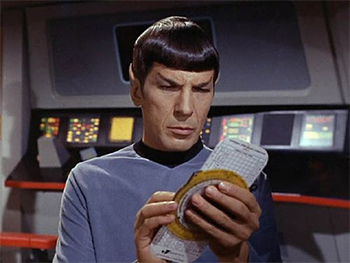
The World Will Be Hopelessly Overcrowded ... At Six Billion People
World population is pushing eight billion. Have you had your soylent green today?
You don't see a lot of stories about the dangers of overpopulation these days -- but back in the '60s and '70s, those were breeding out of control, threatening to overwhelm the planet's carrying capacity for cautionary tales. It was the right time for it, as there was a widespread concern that humanity would soon shag itself out of food. Overpopulation made it to the cover of Time Magazine, and President Lyndon Johnson called it the second greatest threat facing the world (the number one peril being not his penis, but nuclear war).

Soylent Green never tells us how many live in the awful people-eat-people world it depicts -- but the novel does. You didn't know that Soylent Green is based on a novel, did you? The movie loosely adapts Harry Harrison's Make Room! Make Room! -- a book which illustrates overcrowding by having too many exclamation marks in its title.
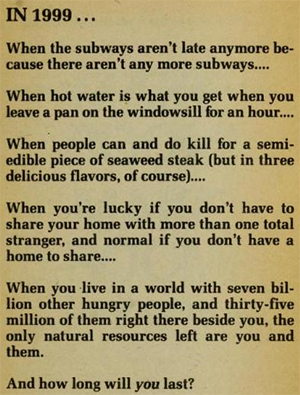
That's right -- this unlivable hellworld has fewer people than the real world. And yet, you don't usually have to choose between dining roasted roommate or going hungry. So what happened? Why aren't we having Steve-Os and Karen Flakes with our breakfast? Norman Borlaug, that happened. This real-life superhero punched food shortage in the dick by introducing new agricultural techniques all over the world, causing what is known today as the "Green Revolution". But back at the time, some were skeptic of Borlaug's efforts. Not gonna work, they said. World hunger is inevitable, claimed popular non-fiction books such as Famine 1975! (exclamation marks were also inevitable, apparently). Their proposed solution was "triage," an idea that... well, in a nutshell, it was pretty much this:
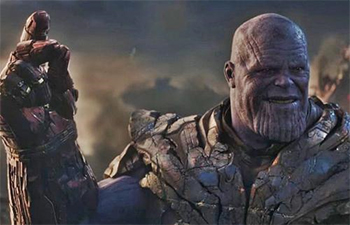
No, of course the authors of the book weren't for vaporizing anyone -- just letting them starve to feed the rest. Entire nations were written off as beyond saving. It was horrible but necessary, they said -- with science fiction writers latching onto the "horrible" part. Isaac Asimov, to name just one, wrote The Winnowing, where a plan is concocted to thin out the population with a selective poison -- while in Ursula Le Guin's The Lathe of Heaven, a hapless Thanos named George Orr retroactively erases most of humanity out of existence with his mind powers. The numbers that trigger these plots? Seven billion people in Le Guin's novel, and a measly six billion in Asimov's short story.
But we can't really hold this one against the writers. They couldn't know that Borlaug would come along and crap all over their doomsday visions. In fact, we should be thankful he did that and we can focus on more pressing issues, like global warming. And speaking of that...
Curbing Global Warming Will Cause Earth To Freeze Over
Two things are especially baffling about the 1991 novel Fallen Angels. For one, its authors aren't just hacks churning out propaganda for oil companies -- they're Larry Niven (remember the organ guy from before?) and his buddy and dubious mustache bearer Jerry Pournelle, both long-established science fiction writers (there's also a guy named Michael Flynn third wheeling along). The second, even more puzzling thing is that the novel is set on a frozen Earth -- you'd think that such a massive dumpster fire would melt all the ice. You won't find another story where the heroes root for pollution.

No, this isn't a convention of Captain Planet villains -- it's a convention of science fiction fans. You see, in the narrative woven by Niven and Pournelle (also Flynn), the science fiction fandom is the last bastion of science and rationality -- so naturally, they all keep saying that global warming is bullcrap. But maybe the authors weren't so far off the mark, considering that this crowd is notorious today for such rational things as review-bombing female-led movies to prove that they're bad.
In this YouTube rant given book form, the Neckbeard Brigade is La Resistance, the Rebels fighting the Green Empire, the She-Ra to environmentalism's Hordak. Science-hating tree huggers are now in charge of the government (along with feminists and the religious right, because why the hell not) and have taken the fascistic step of reducing emissions.
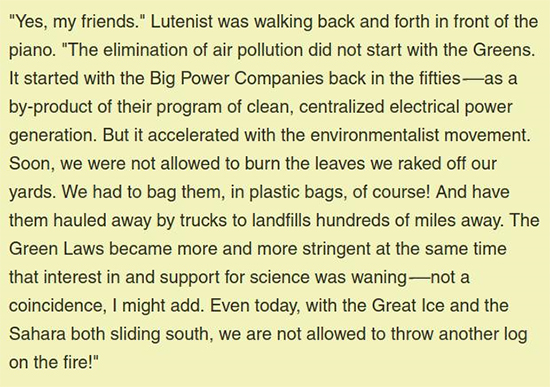
The fools! Didn't they know that pollution was keeping the planet warm? As the Fedora Freedom Fighters explain during a long, winding lecture, the Sun is currently out of commission, giving off less and less heat as it slowly cools down -- so we need greenhouse gases to stop rowdy glaciers from trespassing into our backyards. Yup, this is supposed to be the pro-science camp. Now, to be perfectly fair, the notion that the Sun can temporarily wind down was once put forward by some scientists -- but has since been abandoned, and even at the time it was a crazy idea. It's all true in the novel, though, so the tyrannically clean air results in a Day After Tomorrow scenario. Through frozen wastelands must our plucky heroes drive to get to a functioning rocket (representing, we're guessing, their hard-on for "logic" and "reason"), while outrunning agents of the evil government. And yelling "DEBATE ME!" along the way, probably.
We could say that this book has aged badly in the last 30 years, but really, this book likely came badly aged out of the print shop. It reads like Left Behind for Libertarian tech bros -- you have chosen people snatched to Heaven (astronauts living in space stations), while down here nerds are persecuted by the government for disbelieving global warming. We have to wonder if this makes NASA heroes or villains.
Andres Diplotti is a world authority on puns and dad jokes, and should be commended for not including any in this article (on purpose, at least). His personal website is diplotti.com
Top image: studiostoks/Shutterstock